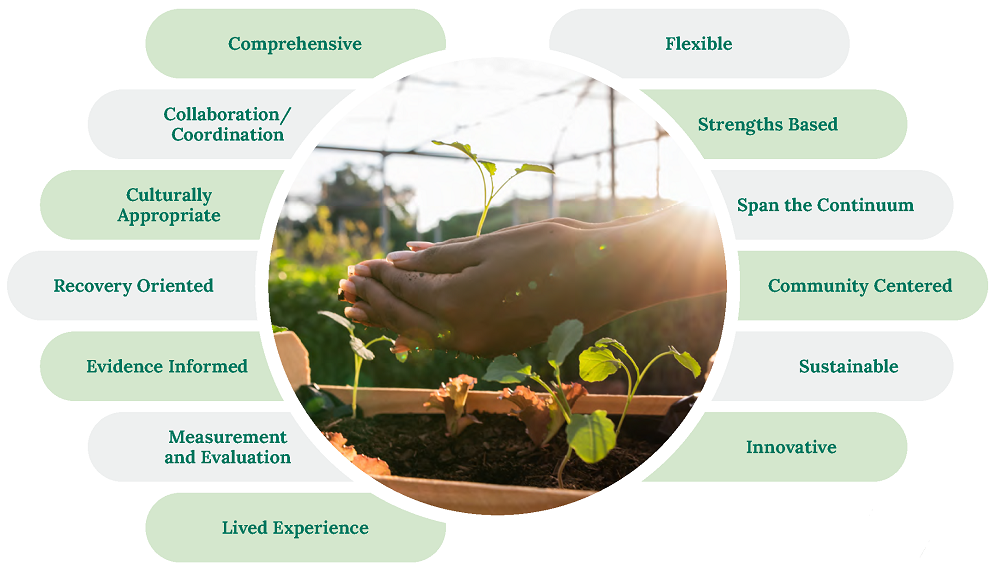Home › Roots of Hope: A community suicide prevention model
Reducing suicide and its impact
Roots of Hope is a multi-site, community-led model that aims to reduce the impact of suicide within communities across Canada. The model builds upon community expertise to implement suicide prevention interventions that are tailored to the local context. It will lead to the development of an evidence base, including best practices and suicide prevention guidelines and tools, to support the scale-up and implementation of a “made-in-Canada” model across the country.

Join the conversation on social media!
The 5 Pillars
The Roots of Hope model provides a structure around which communities can tailor their suicide prevention efforts to meet their unique needs. Communities develop strategies and activities in each pillar and implement these simultaneously.
Specialized Supports
Prevention, intervention, and postvention activities support specific populations or needs. Some examples are peer support, support groups (including self-help), coordinated planning and access to services, and workplace interventions.


Training and Networks
Training and learning opportunities are provided for health-care providers, such as physicians and nurse practitioners, and for leaders in the community, such as first responders, human resource staff, and teachers.
Public Awareness
Educational efforts, such as locally driven campaigns, materials, or presentations, aim to promote mental health awareness, increase help-seeking behaviours, and reduce stigma around suicide. Community members can adopt these practices to develop effective suicide prevention campaigns and foster safer conversations about suicide online and offline.


Means Safety
The methods that people use or the places where a high number of suicides occur need to be identified, and measures need to be taken to remove or ensure safe access to them. For example, barriers can be built on bridges or at railway crossings, or protocols can be created for medication access. Community members can follow these practices to keep their loved ones safe and help reduce suicides by creating a safer home.
Research and Evaluation
The Roots of Hope model includes activities that expand the Canadian suicide prevention evidence base, including setting research priorities, completing surveillance, and monitoring and evaluation of activities and the impact of the model.

The 13 guiding principles:
Comprehensive. Use multiple interventions geared toward a wide range of individuals across a variety of settings.
Culturally Appropriate. Develop, implement, and evaluate interventions that respect a diversity of cultures and are responsive and appropriate (for the overall community and specific sub-populations).
Recovery-Oriented. Focus suicide prevention efforts on giving people hope, treating them with dignity, and meaningfully including them in the decisions being made.
Evidence-Informed. Use evidence‑informed interventions, selected and informed by different kinds of evidence, including those outside of peer‑reviewed quantitative studies
Measurement and Evaluation. Measure outcomes and evaluate interventions to determine their effectiveness and inform future innovations.
Lived Experience. Recognize the important role of suicide attempt and suicide loss survivors, persons with lived experience, individuals bereaved by suicide, and caregivers in guiding suicide prevention efforts.
Flexible. While standardization is important when comparing communities or tracking progress over time, be sure that selected interventions can be tailored to the community for which they are being implemented.
Strengths-Based. Build on existing strengths rather than on identifying and closing gaps.
Span the Continuum. Address suicide across the entire spectrum, including prevention, intervention, and postvention services.
Community Centered. Develop initiatives that are community-led, tailored to its current level of readiness, and driven by engaging and empowering local stakeholders.
Sustainable. Design initiatives that allow for continued funding and leadership.
Innovative. Attempt, evaluate, and share creative and innovative ideas to advance suicide prevention efforts globally.

Roots of Hope Communities:
Today, there are over 20 Roots of Hope communities, including 3 provinces.
- Sooke-West Shore, B.C
- Medicine Hat, Alta.
- Stony Plain/Tri-Region, Alta.
- Edmonton, Alta.
- La Ronge, Sask.
- Prince Albert, Sask
- North Battleford, Sask
- Meadow Lake, Sask.
- Former Keewatin Yatthé Region, Sask.
- Saskatchewan
- Flin Flon, Man.
- Halton, Ont.
- Hamilton, Ont.
- Waterloo, Ont.
- Wellington County, Ont.
- Windsor-Essex, Ont.
- New Brunswick
- Madawaska-Victoria, N.B.
- Northern Zone, N.S.
- Burin Peninsula, N.L.
- Newfoundland and Labrador
National Community of Practice (NCoP)
The Roots of Hope NCoP is Canada’s first National Community of Practice for community-led approaches to suicide prevention and life promotion. The NCoP brings Roots of Hope communities together to engage in peer-to-peer support and connect representatives, researchers, regional stakeholders, and people with lived experience to help advance implementation and action plans and inform future of Roots of Hope initiatives.
We see these connections as a way for each community to sustain their local momentum while participating in a national movement and conversation on suicide prevention and life promotion.

Benefits:
- Increasing connections and collaboration with like-minded and resourceful representatives
- Exchanging knowledge, best practices, ideas, and evaluation plans
- Accessing new and existing tools and resources
- Engaging in collaborative strategic discussions with us on community action plans
- Receiving our support on links and feedback on future funding opportunities.
- Connecting to other opportunities such as research, events, webinars, training, and workshops